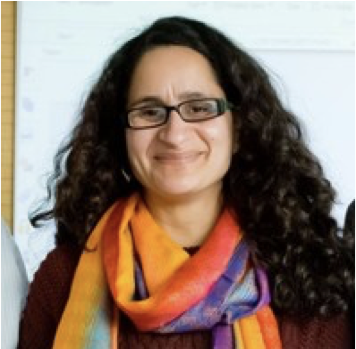
A Myth Busting Guide to a Career in the Arts
Shipra Ogra
I have worked in the arts sector for over 20 years, both in India and UK. I trained as an architect in Delhi, India and chanced upon the arts as a career option. And here I am still going
strong – possibly one of the few Indians working in senior management roles in the culture sector in London.
So here’s my myth busting guide for anyone who might be thinking of having a career in the arts:
1. Myth: You need to be an artist to have a career in the arts
Truth: No
It will certainly help if you have a love of the arts, just as it would help you become a better doctor if you actually loved science. I can’t draw, sing, dance, act to save my life! In my previous role as a Theatre Producer I would always say (jokingly when asked what I did), “everything except being on stage. I am responsible for making sure the actors get on stage, and the audience has a great time”.
So, what did that mean? The role of a Producer can be varied. For a large West End production a Producer might be negotiating contracts with actors who are doing TV as well as stage, they might be exploring options to take the show to other cities across the globe, they might be trying to attract sponsors for hundreds of thousands of pounds, etc. This is the fun stuff. They might also be overseeing any legal challenges brought upon the company for not following suitable HR policies. No prizes for guessing that there are not so fun things as well.
Akram Khan is a famous Asian Kathak dancer based in London. When he was touring South East Asia in 2001, I was working at British Council in Delhi and was responsible for producing the India leg of his show. I didn’t know anything about the technicalities of staging a kathak performance and had to quickly learn to navigate the requirements – is the stage large enough for the performance? Does the venue have the technical capacity to run the show as per the artist’s specifications? Will the technical kit get all the required border clearance for it to come from UK to India and travel onto Bangladesh? I also had to oversee all the travel and logistical needs of the entire troupe of almost 20 people. And run a marketing campaign with local venues to ensure the show sold well in all the cities it travelled to – Chandigarh, Delhi, Mumbai, Bangalore and Kolkata.
The role of a producer is fast paced and a bit of a ‘Jack of all trades, master of none’. Go ahead and experiment with becoming a Producer if you enjoy making an artist’s work come live!
2. Myth: You will always struggle if you take arts as a career
Truth: Not necessarily
Like any career, you will only excel if you are constantly learning, taking the right risks and pushing boundaries. Very few careers nowadays allow one to play safe and still succeed. Scrap that, no career worth doing will allow you to play safe. It will be demanding and rewarding in equal measure. Arts is no different.
There are loads of options if one is keen to make a career in the arts – from being an architect, an arts manager, an illustrator, a games designer, a fashion designer, a digital artist, to being a performing artist or a visual artist. You could even be a finance or legal expert who chooses to work in an arts organisation! Every organisation is run as a business and employ people in Finance, HR, Fundraising, Communications and Marketing roles and if you are at the top of the game you are paid well.
If you are keen to have a career in the arts, try the dream board exercise and set an aim as to where you want to be and work back the steps you will need to get to your dream role.
3. Myth: You need to take only arts subjects for GCSEs/A Levels for a career in the arts
Truth: No
You will need to be good at maths and physics to become an architect. Similarly, you will need excellent computing skills to become a games designer. Having good knowledge of finance will be a nifty skill as a Producer.
I took science for my A levels which allowed me to study Architecture. Even though my career as an architect was short lived, being good at maths helped me a lot with budgeting for projects and monitoring finances for programmes I managed.
I know a few colleagues who got pursued arts management after doing degrees in science, psychology, English. There isn’t a fixed route to enter the arts. And breaking of rules will pretty much guarantee you success!
4. Myth: A career in the arts is for losers
Truth: An emphatic NO
It’s really sad that creative arts on the curriculum has been deprioritised. It’s the thing that we need more than ever. Everyone needs creative thinking, and everyone needs creativity. There is a perception that a creative career isn’t a serious thing when one in every 6 jobs in London is in the creative sector and London’s creative economy is worth £60 million. I currently work at the Greater London Authority as part of the Mayor of London’s Culture team. What excites me about this role is that we are trying to find solutions to societal problems through culture. With the rise in mental health issues, social prescribing is one way we are working with the NHS to signpost patients to cultural activities that improves their health and wellbeing and saves the NHS time and money. Quite often these services are run by community organisations who do not understand the value they bring to society and part of our work is to ensure the right policies are developed to support these organisations to grow this body of work confidently.
So far from being a career for losers, the arts is a wonderful opportunity to break the template and carve a unique path for yourself. It allows you to continue learning and growing. Everything and everyone around you is inspiring. It’s political (with a small ‘p’) as it tackles some of the world’s biggest challenges from climate change to refugee crises and entertaining (with a big ‘E’).
What’s not to like?
Shipra works as Senior Policy Officer, London Borough of Culture at Greater London Authority (LinkedIn)






